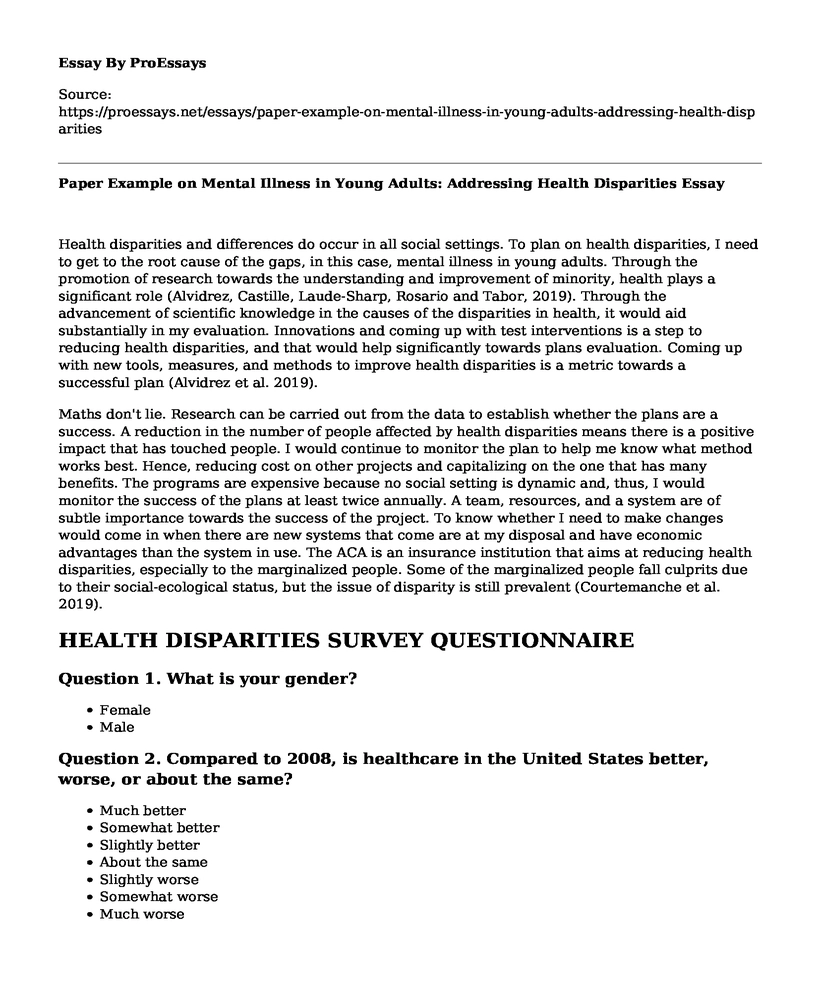Health disparities and differences do occur in all social settings. To plan on health disparities, I need to get to the root cause of the gaps, in this case, mental illness in young adults. Through the promotion of research towards the understanding and improvement of minority, health plays a significant role (Alvidrez, Castille, Laude-Sharp, Rosario and Tabor, 2019). Through the advancement of scientific knowledge in the causes of the disparities in health, it would aid substantially in my evaluation. Innovations and coming up with test interventions is a step to reducing health disparities, and that would help significantly towards plans evaluation. Coming up with new tools, measures, and methods to improve health disparities is a metric towards a successful plan (Alvidrez et al. 2019).
Maths don't lie. Research can be carried out from the data to establish whether the plans are a success. A reduction in the number of people affected by health disparities means there is a positive impact that has touched people. I would continue to monitor the plan to help me know what method works best. Hence, reducing cost on other projects and capitalizing on the one that has many benefits. The programs are expensive because no social setting is dynamic and, thus, I would monitor the success of the plans at least twice annually. A team, resources, and a system are of subtle importance towards the success of the project. To know whether I need to make changes would come in when there are new systems that come are at my disposal and have economic advantages than the system in use. The ACA is an insurance institution that aims at reducing health disparities, especially to the marginalized people. Some of the marginalized people fall culprits due to their social-ecological status, but the issue of disparity is still prevalent (Courtemanche et al. 2019).
HEALTH DISPARITIES SURVEY QUESTIONNAIRE
Question 1. What is your gender?
- Female
- Male
Question 2. Compared to 2008, is healthcare in the United States better, worse, or about the same?
- Much better
- Somewhat better
- Slightly better
- About the same
- Slightly worse
- Somewhat worse
- Much worse
Question 3. Is screening for various mental health at the disposal of the people around your region?
- Yes
- No
Question 4. How many people living in your household are currently employed AND looking for work?
Question 5. Do you currently receive medical benefits from your place of work, or not?
- Yes, I do
- No, I do not
Question 6. What is the highest level of school you have completed or the highest degree you have received?
- Less than a high school degree
- High school degree or equivalent (e.g., GED)
- Some college but no degree
- Associate degree
- Bachelor degree
- Graduate degree
Question 7. How congested is the traffic in this neighbourhood?
- Extremely congested
- Very congested
- Somewhat crowded
- Not so crowded
- Not at all congested
Question 8. During the past four weeks, how bothered did you feel by emotional problems such as feeling anxious, depressed, irritable, or sad?
- Extremely bothered
- Very bothered
- Somewhat bothered
- Not so bothered
- Not at all bothered
Question 9. In what type of community do you go to school?
- City or urban community
- Suburban community
- Rural community
- Other (please specify)
Question 10. Can you comfortably say you satisfied with the healthcare- services within the society?
- Strongly Disagree
- Disagree
- Neutral/Neither agree nor disagree
- Agree
- Strongly Agree
Question 11. Have you heard of this ACA service? If yes, do you wish to work with it, especially in your current financial state?
- Yes, and I have owned one
- Yes, but I have never owned one
- No
- Other (please specify)
References
Alvidrez, J., Castille, D., Laude-Sharp, M., Rosario, A., & Tabor, D. (2019). The National Institute on Minority Health and Health Disparities Research Framework. American journal of public health, 109(S1), S16-S20.
Courtemanche, C. J., Fazlul, I., Marton, J., Ukert, B. D., Yelowitz, A., & Zapata, D. (2019). The Impact of the ACA on Insurance Coverage Disparities After Four Years (No. w26157). National Bureau of Economic Research.
Cite this page
Paper Example on Mental Illness in Young Adults: Addressing Health Disparities. (2023, Feb 27). Retrieved from https://proessays.net/essays/paper-example-on-mental-illness-in-young-adults-addressing-health-disparities
If you are the original author of this essay and no longer wish to have it published on the ProEssays website, please click below to request its removal:
- Emotions Influence on Athletes and Teams Paper Example
- How Do Interdependent Communities Differ in Suicide Rates Versus Independent Communities?
- Randy's Case: Schizophrenia
- Paper Example on Young Adults in Stress: The Impact of the Stressor
- Essay Example on Effexor: A Comprehensive Guide to Antidepressant Treatment
- Ivan Pavlov: Father of Classical Conditioning and Behaviorism - Essay Sample
- Psychoactive Drugs & Risks in Children with Disorders - Essay Sample







